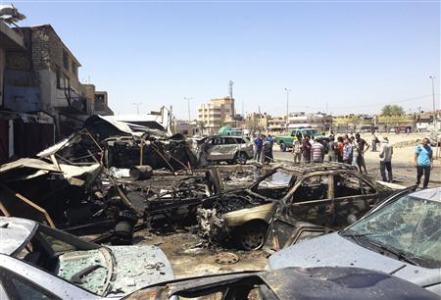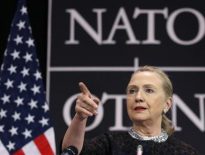(Reuters) – Seventeen car bombs exploded in Iraq on Monday, killing at least 55 people in predominantly Shi’ite areas in some of the deadliest violence since Sunni insurgents including al Qaeda stepped up attacks this year.

Police and medical sources said the attacks, which appeared to be coordinated, were concentrated on towns and cities in Iraq’s predominantly Shi’ite south, and districts of the capital where Shi’ites reside.
The car bomb attacks in busy streets and crowded markets underscore deteriorating security in Iraq, where nearly 4,000 people have been killed since the start of the year, according to violence monitoring group Iraq Body Count.
The violence has raised fears of a return to full-blown conflict in a country where Kurds, majority Shi’ite and minority Sunni Muslims have yet to find a stable way of sharing power.
At least 10 people were killed when two car bombs blew up near a bus station in the city of Kut, 150 km (95 miles) southeast of the capital, police said.
Four more were killed in a blast in the town of Mahmoudiya, about 30 km (20 miles) south of Baghdad, and two bombs in Samawa, further south, killed two.
The rest of the bombings took place in regions of Baghdad, in Sadr city, Habibiya, Hurriya, Bayaa, Ur, Shurta, Kadhimiya, Risala, Tobchi and Abu Dsheer neighborhoods.
In July, more than 810 people were killed in militant attacks.
Iraqi forces patrolling alone since U.S.-led troops left in 2011 are struggling to contain a resurgent al Qaeda, which has been regrouping and striking with a ferocity not seen in years.
Sectarian tensions across the region have been inflamed by the civil war in neighboring Syria, which has drawn Shi’ites and Sunnis from Iraq and beyond into battle on opposite sides.
(Reporting by Kareem Raheem in Baghdad, Aref Mohammed in Basra and Jaafar al-Taie in Kut; Writing by Isabel Coles; Editing by Elizabeth Piper)





